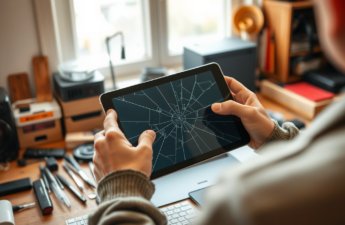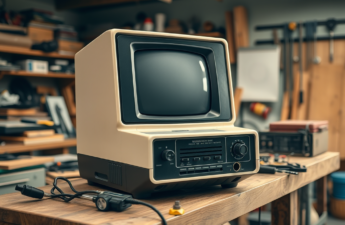Cleaning your laptop of unnecessary programs and files is a key step to maintaining its performance and reliability. Over time, a lot of unnecessary “digital junk” accumulates on your computer, which can slow it down and reduce free disk space. In this article, we will look at how to clean your laptop of unnecessary programs yourself so that your device works efficiently and safely.
Why cleaning your laptop is important

Improving performance
When There is not enough free space on the laptop’s hard drive, and the operating system begins to work slower. Removing unnecessary programs and files helps restore your computer’s performance. This is especially important to know if you are interested in how to clean your laptop without slowing down on your own.
Freeing up hard drive space
Deleting unnecessary content can significantly free up usable hard drive space for important files such as documents, photos and programs.
Enhance security
Viruses and malware often disguise themselves as ordinary unnecessary files or programs. Therefore, by learning how to properly clean your laptop of unnecessary files, you also increase the security of your system.
Preparing to clean your laptop

Data backup
- Connect an external hard drive or provide access to cloud storage.
- Copy all important files and folders to it.
- Check that all data has been successfully copied and is available for recovery.
Before you begin the basic steps of cleaning your device, you need to take care of the backup. This will allow you to safely follow the procedure on how to clean your laptop of unnecessary programs and files without the risk of losing important data.
Updating software
Update your system and all installed applications. This is an important step in preparation because the latest updates may include tools to better optimize your device and fix errors that were taking up extra disk space.
Step-by-step instructions for removing unnecessary programs

Usage standard operating system tools
Most operating systems provide tools for removing programs. For example, in Windows, this can be done through “Control Panel” > “Programs and Features”, which is the initial step of the procedure when the user wants to know how to clean the laptop from unnecessary programs.
Programs for removing programs and comprehensive cleaning
There are a lot of third-party programs on the market designed to clean a laptop, such as:
- CCleaner
- Revo Uninstaller
- IObit Uninstaller
These applications often offer advanced features over standard OS tools and can be useful for users looking for tools beyond traditional methods.
Manually uninstalling programs and components
Sometimes programs leave behind service files or downloads after they are removed. In such cases, you may need to manually remove residual files. Periodically audit the folders in “Programs Files” and “Programs Files (x86)” for remaining folders from previously deleted programs.
Cleaning the laptop from temporary and unnecessary files
Cleaning system temporary files files
Temporary system files, such as the operating system and program caches, take up extra space on the hard drive. Cleaning these files regularly helps improve your laptop’s performance. In Windows, you can use the built-in Disk Cleanup utility to get rid of them. < /tr>
| Step | Description |
|---|---|
| 1 | Delete temporary files: Clear temporary files, temporary internet files, and recycle bin files. |
| 2 | Uninstalling programs: Check the list of installed programs and remove those that are no longer needed. |
| 3 | Cleaning downloads: Review your Downloads folder and delete unnecessary files, and move those you need to other places. |
| 4 | Clearing the browser cache: If you use web browsers, clear cache and temporary files. |
| 5 | Disk defragmentation: Check disk defragmentation and perform it if necessary. |
Deleting browser cache files
Browsers also save temporary files, such as Internet cache -pages and cookies. This makes sites you visit load faster, but can slow down the browser itself over time. Periodically clearing your browser cache frees up space and can make pages load faster.
Emptying the Recycle Bin and old downloads
Remember to empty your Recycle Bin regularly, as files deleted from it continue to take up disk space. It’s also a good idea to go through your downloads folder and remove old or no longer needed files.
Keeping your laptop clean regularly
Scheduling a system clean
Set reminders for regular cleaning laptop. This could be, for example, once a month. This approach will avoid the accumulation of a large amount of unnecessary data and will ensure stable and fast operation of the system.
Automatic tools and programs
- Install a program to automatically clean the system, for example, CCleaner. It will keep your laptop clean and automatically delete temporary files.
- Use Windows Task Scheduler or similar tools to automatically perform routine cleaning.
Tips for daily use< /h3>
Be careful what you install and download. Avoid installing dubious programs or opening suspicious email attachments to reduce the chance of your laptop becoming contaminated with unnecessary data.
Bottom Line
To keep your laptop in good working condition for a long time, maintain it regularly cleaning of unnecessary programs and files. In addition to freeing up disk space and improving performance, you will also improve the security of your data. Getting into the habit of regularly performing these simple steps is not difficult, and it is guaranteed to make using your laptop more enjoyable and efficient.
Frequently Asked Questions
Question: How many times a month should you clean your laptop of unnecessary programs?
It is recommended to completely clean your laptop at least once a month, but the exact frequency may depend on the intensity of use of your device.
Question: What programs for What are the most effective laptop cleaners?
Programs like CCleaner, Revo Uninstaller, and IObit Uninstaller are highly trusted due to their convenience and wide range of functions.
Question: Can data be damaged when cleaning a laptop?
To avoid data loss, always back up important files before cleaning.
< strong>Question: Is it worth using third-party applications to remove programs if standard OS tools are available?
Third-party applications can provide deeper scanning and removal of residual files, which standard OS tools do not offer. < p>Question: What should I do if, after cleaning the laptop, performance problems persist?
In this case, you may need to defragment the disk, check for viruses, or contact a specialist to diagnose the laptop.



